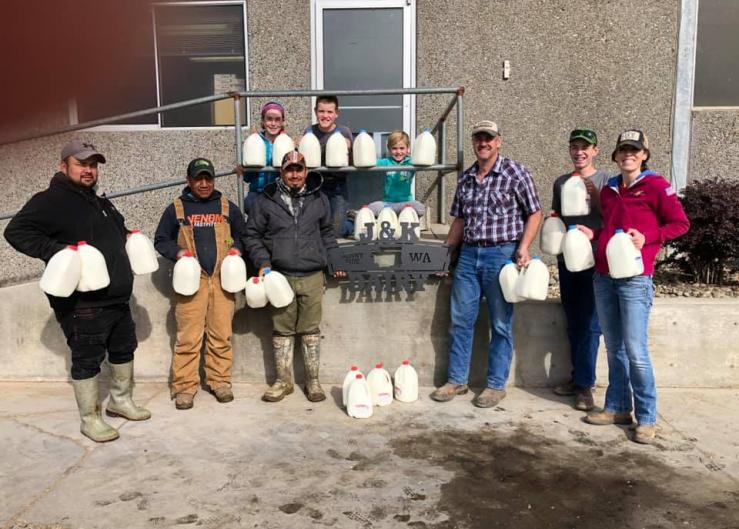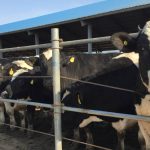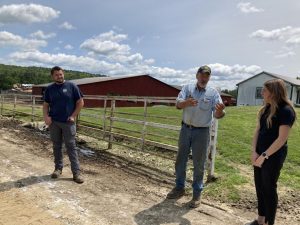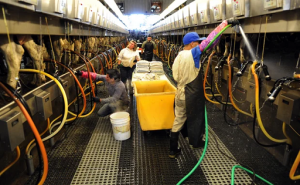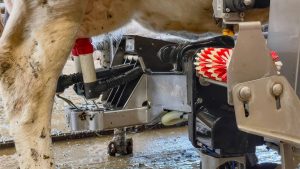
This came after the Washington Supreme Court ruled in favor of the state’s dairy workers to receive overtime pay equating to time and half after 40 hours. Before this ruling, the Washington law followed the federal law and agricultural workers were exempt from receiving overtime pay. The state of Washington has the highest minimum wage in the country at $13.69, although agricultural workers average much more than that.
Fourth generation dairy farmer, Jason Sheehan, who runs J & K Dairy located 45 minutes outside of the Tri-Cities in eastern Wash., has been paying some form of overtime pay to his dairy employees for years, as he watched other states, like New York and California slowly introduce overtime practices. Sheehan followed their plans with an initial 50-hour workweek; decreasing five hours annually to eventually get to the 40-hour workweek.
The Sheehan’s 3,000 cows produce 265,000 pounds of milk daily and the family farms 1,400 acres of cropland, all of which goes back to feeding the herd. The dairy employs 38 full-time workers, of which 80% have been there for three years and of those experienced staff, more than a third have 10 to 24 years with the dairy, Sheehan reports.
“Yes, we have people that have been with us for a long time,” Sheehan says. “If the pay was an issue with our employees, they would have gone and found work elsewhere.”
Despite going above and beyond the previous overtime law, the Sheehans got sued by a former employee seeking three years of back pay on overtime hours. Sheehan testified several times about the situation. “I have no issue with paying overtime. My biggest issue was having to pay back pay on overtime. We follow the law, actually, we go above and beyond it and then we are hit with a lawsuit,” Sheehan reported.
One of Sheehan’s former employees filed a class action lawsuit against them in hopes to receive back pay for overtime hours not paid. This kind of lawsuit was happening to other fellow Washington dairy farmers, too, like third-generation dairy farmer Tony Freeman who owns and operates Sunny Royal Slope Dairy in Othello. Freeman also had a long-time former employee sue for overtime pay. Freeman milks 500 cows with his family and has four full-time and a handful of part-time employees.
Before Washington’s overtime law change, Freeman’s employees were all salaried and now he says the state has so many stipulations and requirements that salary is no longer an option for his dairy. “Now we pay hourly and upwardly adjusted the pay on all our employees,” Freeman says. “The employees don’t like it because their paycheck varies.”
Sheehan agrees, stating that now all of his employees clock in and out and have to document break times. Although Scott Dilley, communication director for Washington State Dairy Federation, stated that dairy farmers are relieved that the retroactive compensation problem has been resolved. “That was our highest priority during this past legislative session,” Dilley says. “Clearing up questions about that potential liability now allows farmers to focus on current and future workforce needs, costs and innovation and on adoption of labor-saving technology.”
Sheehan agrees, saying that if dairy farmers had to back pay overtime, many dairies would exit the business. His employees average between 50-60 hours a week, as cutting hours is not something they have considered doing. Like most farmers who are also owner-operators, the Sheehan’s haven’t reduced their own hours. Instead, they plow forward, even when they hit 40 hours by mid-week. “We have to work until the job gets done,” he says. “That is the farmer’s motto and really what we can focus on is continuing to do a good job of taking care of our cows, land and employees, and deal with the punches as they are thrown at us.”
Freeman concurs as he states that reducing hours for his employees consequently forced family members to pick up the slack and work longer hours. This is easier said than done, as spare hours are far and few in-between for the Freemans, who in addition to milking 500 cows, farm 500 acres as well as custom farm another 2,000 acres. “Our employees might work longer hours one day, but then less the other because of the new 40-hour overtime law,” Freeman says. “The extra work falls on family.”
Freeman’s son, Tanner, is taking over the management of the dairy and would like to grow the dairy in terms of numbers. “We have to continue to look at something else to offset the decay rate,” Freeman says. The decay rate is what Freeman refers to resulting from the decay of his income. “Somehow we need to generate efficiencies to gain dollars, whether that is milking more cows, doing more work ourselves, or bringing in additional income from outside work.”
Moving forward, both dairy producers are concerned about the future of finding good help and Sheehan states that it will continue to be a struggle to find people who want to work. The Sheehan’s handle every aspect of the farm in-house except for hoof trimming, veterinarian work and A.I. breeding and states that his dairy must evaluate the true cost of performing jobs. “What used to be cheaper for us to perform in-house might no longer be the case.” His farms’ labor cost has increased 5%-10% since November.
Dilly claims the shutdown of Senate Bill 5172 that protected Washington dairy farmers from the possibility of being ordered to pay three years of overtime pay retroactively saved $120 million for dairy and $2 billion for all of agriculture if these back pay claims were awards, as well as helped to keep Washington’s 330 dairy farmers in the state. He reports that with more states and even Congress looking at the issue of agricultural over time, the national landscape on this issue may change over the next few years, bringing more of the country in line with Washington state standards.
Sheehan believes some good has stemmed from the overtime bill, as it incentivizes employees to work. “If an employee requests a day off, this motivates another employee to fill in, as they know they will get overtime pay,” he says. Freeman says farmers always rise above and find solutions to new problems, but also said he is thankful that the back pay bill passed so the “claw back” of overtime would not happen.
